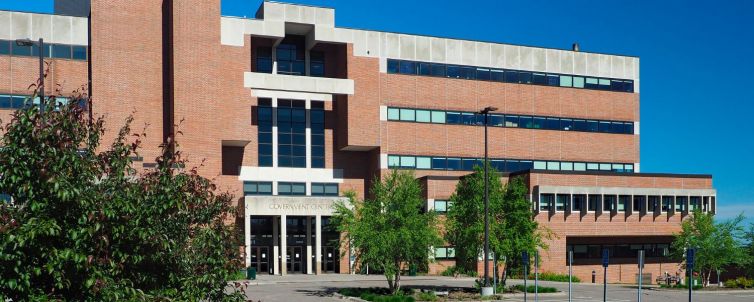University of North Texas
How FMS:Workplace helped UNT transition to remote learning during COVID-19, plan for their return to campus, and develop a hybrid workplace strategy for the future.
The Customer
The University of North Texas (UNT) is one of Dallas-Fort Worth’s largest and most comprehensive universities. The University offers more than 200 different degree programs and is a Carnegie Tier One public research university. UNT is a public institution with roughly 1,600 faculty members and 3,000 staff working within 14 colleges, a satellite campus, and the Texas Academy of Mathematics and Science for exceptional high school students.
The Challenge
As a Texas public university, UNT complies with rigorous reporting requirements to the state and federal government. The reports and the associated space data are used in the determination of Educational and General funding for the institution, and for negotiation of the Facilities & Administrative Rates (F&A) for federal grants. The Colleges housed at the university are all officially accredited by various agencies. Accrediting requirements include strict space accounting provisions. FMS:Workplace data is used in every step of university planning to meet the needs of growing programs, new grants and increasing enrollment.
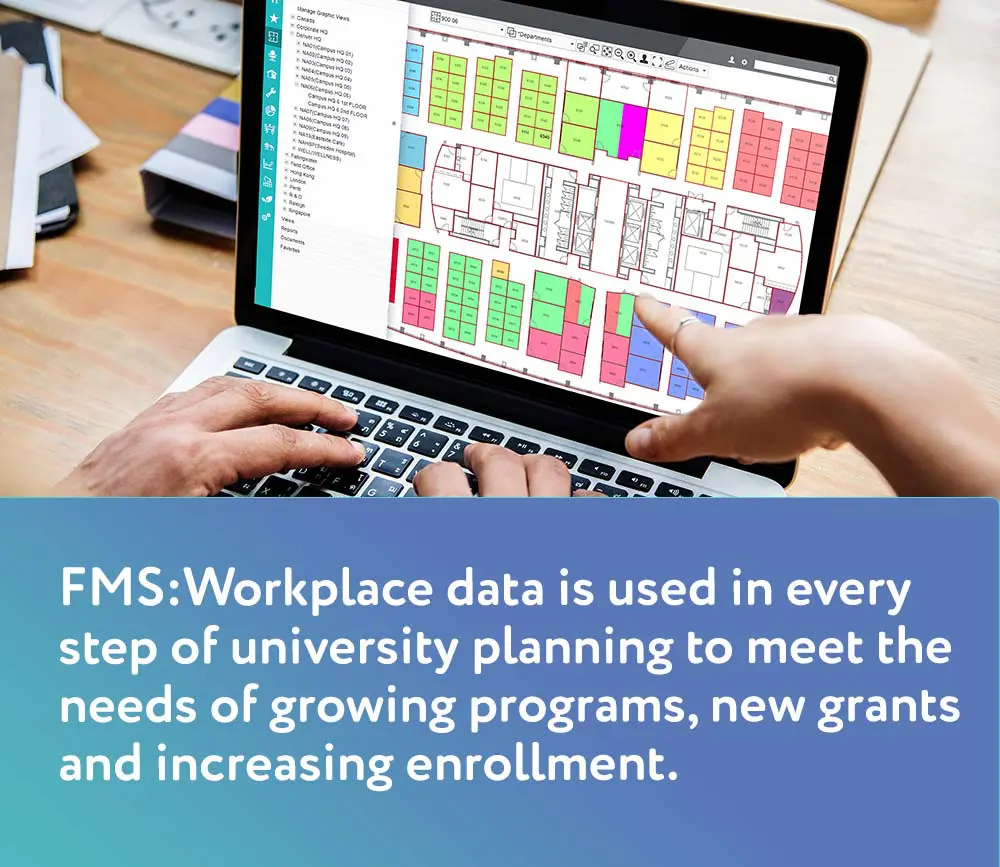
Additionally, UNT’s Space Planning Team played an essential role during the university’s response to the COVID-19 pandemic. From the initial challenges of transitioning to remote learning to bringing students back with proper social distancing, the Space Planning team needed to provide accurate space information to aid with pandemic planning and actions.
– Cheryl Benningfield, Space Planning Manager
The Solution
FMS:Workplace empowers higher education organizations to simplify annual space surveys and gather defensible data needed to drive Indirect (Facilities and Administrative) Cost Rates and maximize funding. Having complete, accurate data about all of the space on a campus or campuses allows institutions to improve the efficiency of spaces and identify areas to increase productivity and reduce costs. Using FMS:Workplace, UNT greatly enhanced their space survey process and enjoys a single source of truth for space management data. They have real-time data and flexible reporting that is used for strategic planning and decision-support—a critical need for an institution that’s 97% occupied, especially during the COVID-19 pandemic.
Navigating the Pandemic and Transitioning for the Future
Like all public institutions, UNT had to make rapid changes in space management to respond to the COVID-19 pandemic. FMS:Workplace helped in every phase of pandemic response and in preparing the campus for a safe return of students. In March 2020, as mandatory shutdowns and social distancing protocols were put in place, the university transitioned to fully remote learning for all students and classes.
In 2021, the school began transitioning in phases, with about 30% to 40% of classes conducted face-to-face with limited capacity and six-foot social distancing, and the rest of courses offered through remote, online and hybrid options. All dorms and residence halls were reduced to single capacity rooms. Starting in the fall, UNT will return to full capacity in classrooms and labs for in-person learning.
Safety and well-being are primary concerns. To encourage vaccination of students and staff, UNT started an incentive program, giving away prizes, sporting event tickets, free meals and more. The university has enhanced cleaning protocols in place, and HVAC systems are set to turn over the air more frequently throughout every building.
Annual Space Survey
One of the ongoing challenges for the university is keeping their space information updated due to the changing nature of their physical space inventory. To help solve this problem and to ensure the accuracy of their space data the university issues a formal survey to all departments annually and on an ongoing basis throughout the year. The results of the survey allow them to see what current data is associated with each space and to suggest changes for future updates.
UNT continues to add items to their survey based on departmental or administrative requests and as the need to track these items grows, the Higher Education Survey module takes on an even greater significance by giving them ready access to accurate information. Data from FMS:Workplace is exported daily to other systems on campus and is used for asset tracking, work orders, class scheduling, classroom support, risk management, access control, and emergency planning and operations.
Federal and State Reporting Requirements
With the state of Texas having one of the most stringent reporting requirements in the country, FMS:Workplace has proven to be an indispensable tool for the university. UNT is now able to generate files instantly which are then transmitted to the state for required annual reporting. Prior to implementing FMS:Workplace, this process took months and consisted of long hours and numerous submissions to the Texas Higher Education Coordinating Board to produce a successful report. Now they have organized and accessible data that is also used extensively for campus planning and management.
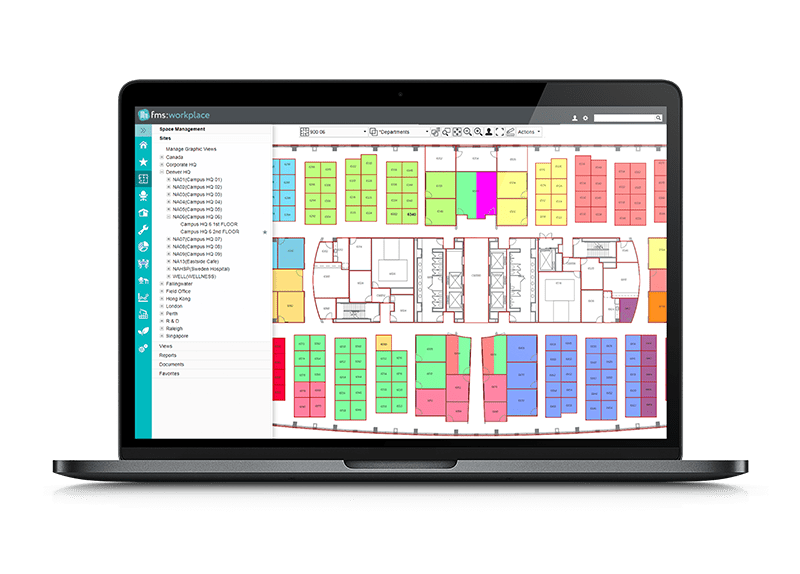
As a Carnegie tier-one research university, UNT carefully tracks the utilization and productivity of research spaces, using the Higher Education Survey module. The space planning team tracks research activity, the principal investigators, and grants associated with each research space. To assist the University in strategic planning, the team provides a wealth of data, all of which supports efforts made to ensure the best use of university resources.
“We track some room amenities, including research equipment like fume hoods and incubators and growth chambers and specifically grant-funded equipment,” Benningfield stated. “We provide data to make strategic decisions down to the productivity of the researchers’ dollars per square foot.”
Strategic Decision Making
UNT extensively uses the FMS:Workplace Space Management module to produce required formal and ad-hoc reports used for tracking, strategic decision making, facility planning, scheduling, and extensive data warehousing of valuable facilities management information. FMS:Workplace is used daily by a variety of staff and faculty members ranging from administrators to facilities personnel, deans, department chairs, and university coordinators, who use it for many different purposes such as; planning, seating charts, determination of funding for maintenance costs, leasing, scheduling, and facilities maintenance and planning.
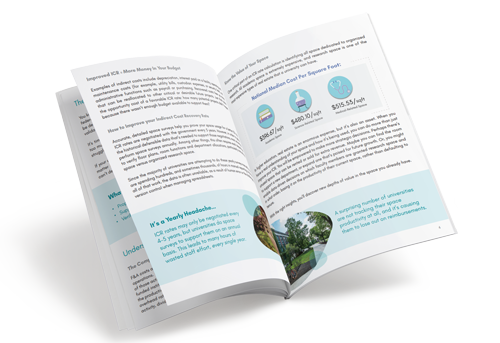
Are your F&A audits taking too much time and effort? Download our guide.
What you need to know to maximize your indirect cost recovery (ICR) rates to get the most federal funding possible.
“The value of having the FMS:Workplace system throughout this whole process—I just can’t stress enough how valuable that resource was, for us to be able to pull up to start with the list of rooms and the capacities; then, as we went forward, to identify what we call extra spaces and the capacities we could have there as well. I’m not sure we could have even gotten it done without FMS:Workplace.”
– Cheryl Benningfield, Space Planning Manager
What’s Next
UNT Space Planning continues to build out their capabilities with FMS:Workplace. They are in the process of building out the system to add the UNT Dallas campus and the UNT System campus to their instance of FMS:Workplace. Each campus will be a separate environment in the system, but UNT will also be able to leverage shared data over all campuses. Access to the bigger picture of space utilization across the entire UNT system will give more opportunity to make strategic space management decisions.
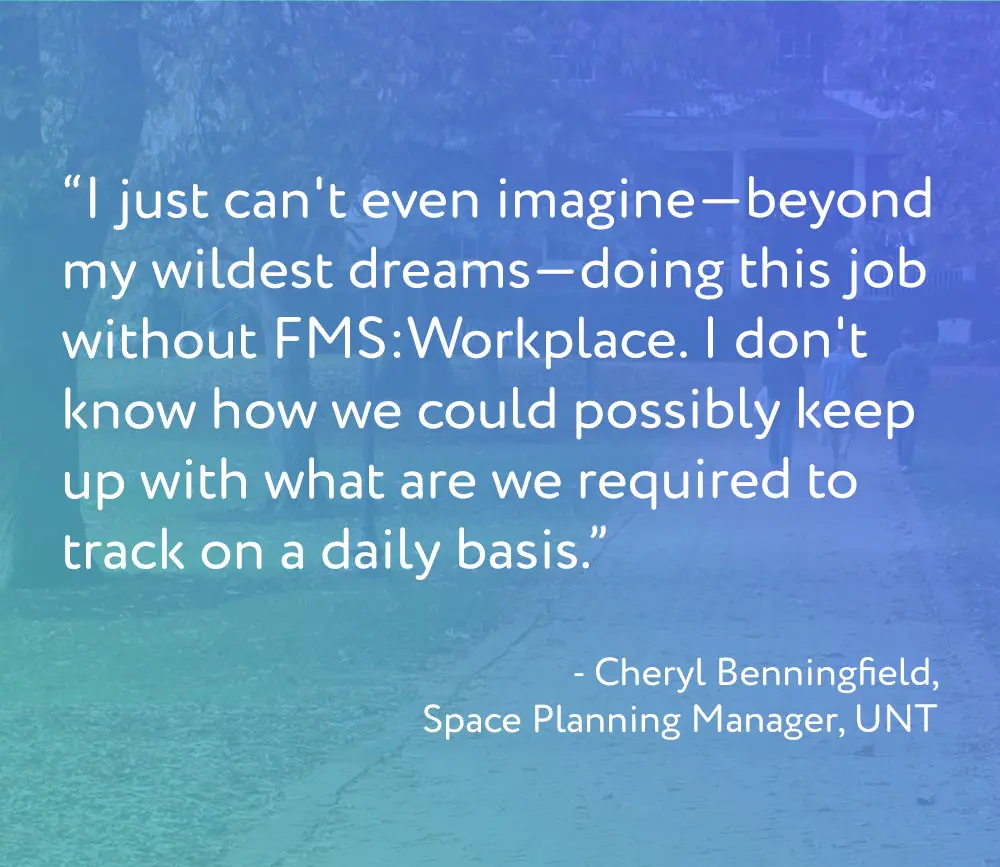
Supporting a Remote/Hybrid Workforce
All of the faculty and staff at UNT worked remotely for over a year before returning to campus. Many employees really liked working from home and would like to continue in some capacity. Therefore, UNT leadership is exploring how to best support a hybrid workforce in the future. They are considering whether to pursue an office hoteling strategy or simply leave spaces assigned as they are now, but let employees split their time between their campus offices and homes.

“Our campus is looking to potentially offer some options for at least part-time work from home and of course, exploring the opportunity of full-time remote workers and recapturing the space assigned to them. Such initiatives could really produce a great deal of empty space,” said Benningfield. “I really think as we move forward to the marketplace for jobs, we’ll have to have more options available to keep up.”
“So, we are looking at setting up new areas of hoteling space. We have always had some, because we have a number of employees that move between campuses and provide services at multiple locations. But they are looking at additional hoteling space. It’s a work in progress. We expect to remain fluid.”
“I’ve had a wonderful working relationship with FM:Systems for at least 12 years and I continue to have that relationship. It’s a great team to work with.”
– Cheryl Benningfield, Space Planning Manager
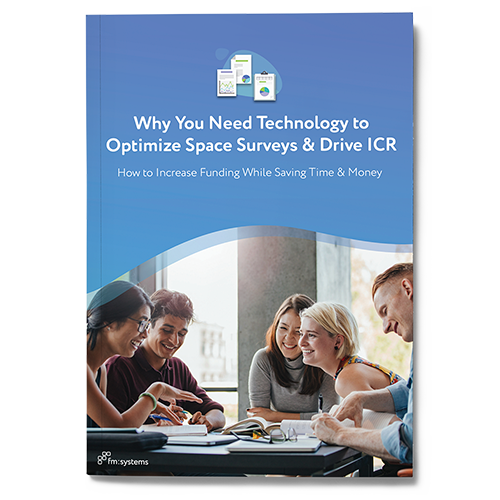
Make your annual space survey process faster, easier and more accurate
Download our guide on how your university space team can simplify reporting, improve ICR rates and gain insights for more informed, strategic decision-making.







